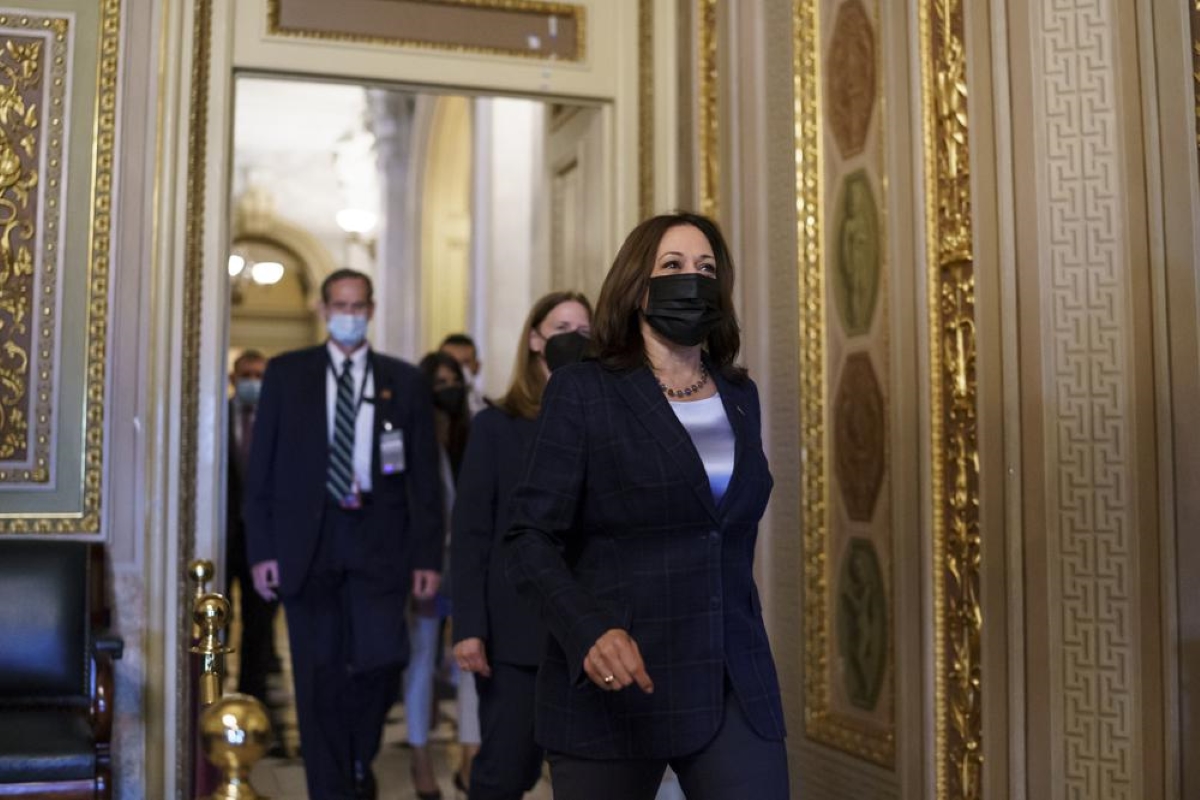Biden deepfake exposes vulnerabilities
An unknown number of New Hampshire voters received a phone call on 21 January 2024, from what sounded like President Joe Biden.

Vice President Kamala Harris arrives at the Capitol.
As the Senators are set to resume a weekend session toward passage of a $1 trillion bipartisan infrastructure package, momentum has dragged as a few Republican senators refused to yield 30 hours of required debate before the next set of procedural votes, which could delay its swift passage.
“We can get this done the easy way or the hard way,” Senate Majority Leader Chuck Schumer, D-N.Y., said Saturday. But as the hours ticked away without results, Schumer said senators would resume at noon Sunday.
Advertisement
Senators were meeting for the second consecutive weekend to work on the Infrastructure Investment and Jobs Act, which is the first of Biden’s two infrastructure packages. Once voting wraps up, senators immediately will turn to the next item on Biden’s agenda, the budget outline for a $3.5 trillion package of child care, elder care and other programmes that is a much more partisan undertaking and expected to draw only Democratic support.
Advertisement
Schumer has vowed to keep senators in session until they finish up the bipartisan bill and start the initial votes on the next big package.
For some Republican senators, the back-to-back voting on Biden’s big priorities is what they are trying to delay, hoping to slow or halt what appears to be a steady march to achieve the president’s infrastructure goals.
Sen. Bill Hagerty, R-Tenn., an ally of Donald Trump and the former president’s ambassador to Japan, was among those leading the effort for the Senate to take as much time as needed to debate and amend the bill.
“There’s absolutely no reason to rush,” Hagerty said during a floor speech Saturday.
Trump himself has weighed in including a statement on Saturday criticizing Biden, senators of both parties and the bill itself, though it’s not clear whether the former president’s views hold sway over the lawmakers.
Biden has encouraged senators on, saying the bipartisan package offered an investment on par with the building of the transcontinental railroad or interstate highway system. Vice President Kamala Harris arrived on Capitol Hill for meetings on the bipartisan legislation.
In all, 18 Republicans joined Democrats on the 67-27 vote to push the measure past a filibuster, a robust tally.
Senate Republican leader Mitch McConnell of Kentucky has so far allowed the bill to progress, despite the broadsides and name-calling coming from the former president. His vote Saturday — another “yes” — was closely watched. “This is a compromise,” McConnell said.
More amendments could be debated Sunday.
Sen. Lisa Murkowski, R-Alaska, said the needs in her state were obvious — including money for water systems in remote villages without running taps for handwashing during the Covid-19 pandemic. But as one of the negotiators, she also wants to demonstrate that lawmakers can unite.
“The Senate needs some demonstrated acts of bipartisanship,” she said.
Sen. Joe Manchin, D-W.Va., said, “America has not seen this type of infrastructure investment in 30 years.”
An analysis of the bill from the Congressional Budget Office drew concerns, particularly from Republicans. It concluded that the legislation would increase deficits by about $256 billion over the next decade.
But the bill’s backers argued that the budget office was unable to take into account certain revenue streams — including from future economic growth.
The House is in recess and is expected to consider both Biden infrastructure packages when it returns in September.
Advertisement